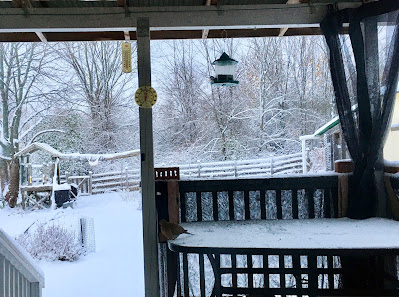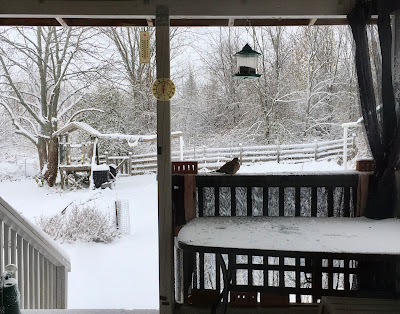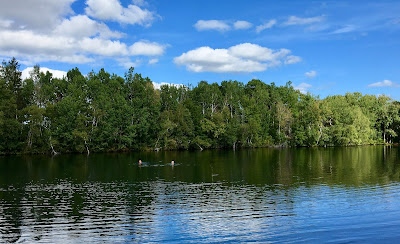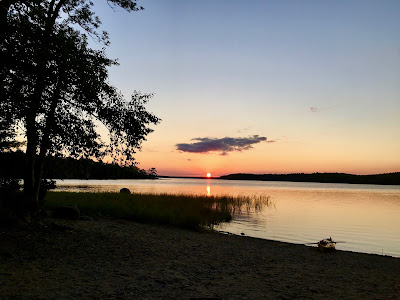It's a good rainy windy day to stay indoors and recuperate.
I went to the clinic yesterday, about an hour's drive away on the highway. The highway goes through the interior forest of the province, rocks, lakes and trees. The reds and golds of the maples and birches were nicely setoff by the dark green of pines and spruces. A very nice drive.
The visit itself was long and tiring, I was there for 3 hours seeing a nurse practitioner and a care coordinator. They deal with longterm complex chronic conditions and I fit right in. I actually felt validated, this is not all in my head, it's not psychological, it's a real physical illness that is not well understood by doctors and medical researchers. The diagnosis I got is a kind of either/or thing; it's either Long Covid or it's ME/CFS or it's ME/CFS triggered by Covid.
They have two streams of treatment, one for Long Covid and one for everything else which they refer to as Central Sensitization (Fibro, ME/CFS, PTSD, and a bunch of others). They will let me know which stream they are assigning me to but they are not hugely different. The main thing is that they recently got funding for Long Covid and have to keep it separate, but seem a little vague as to whether a positive Covid test is a requirement. A lot of people had Covid in the early days but couldn't get tested because of the restrictive testing criteria at the time. So they believe I had it, they just don't know whether the lack of a positive test disqualifies me under the funding terms.
Ironically, when I was sick I was offered a test but I declined it because if it came back positive I would have to be quarantined and then I could not take Hapi off the property for a walk. She would have driven me crazy. At least without the test I wasn't quarantined. I did stay away from people and wore a mask when outside my house and got all my shopping done by neighbours, so I don't think I put anyone at risk.
It's going to be another few months before treatment actually starts, sometime in 2022. Not that there is a cure (there's not) or even an agreed upon treatment protocol, but simply guidance, support, various therapies for symptom management and referrals for testing as needed. So it doesn't really matter which stream I end up in, the only significant difference is that the Long Covid stream has a physiotherapist and the Central Sensitization stream does not. We have free physio at our local health clinic in town so if I needed that I could probably just get them to refer me there. Although I wouldn't even need a referral, I could just put myself on the waitlist. I don't feel like I would benefit from physio, but who knows.
I came away feeling quite positive about the whole experience, but exhausted by the time I got home. An interesting thing I learned is that many people in my condition often have good summers and then crash in the late summer/early fall. That has certainly been my experience. I was told that the crash could last till next summer. Or, I might improve a little over the winter and then crash again in the spring. That's more or less what happened this past year, so I guess I can expect more of it. I am glad I got a good summer. I also learned that I am very unsteady on my feet. I kind of knew that but the tests made it very clear.
The NP said, "I won't make you try to walk a straight line heel to toe because I can see that you would just fall over."
A couple of weeks ago I went for coffee with a friend who has been otherwise supportive, and she strongly urged me to not go to the clinic. That really I was just anxious about the pandemic. That kind of ticked me off, it's what I don't like about an invisible illness: people feel free to tell you it is not real. So it was nice to be somewhere that I was taken seriously and know that they deal routinely with a lot of people like me.
~ ~ ~ ~ ~ ~
I spoke to a neighbour the other day on the street, she's a lot more politically active than I am. At any rate she has recently written a lengthy letter to the town council about the student situation in our neighbourhood. She forwarded the letter to me and later in the day I read it; it was quite an eye opener. I tend to keep my head down about local issues because when I get involved I don't like what I see and it is a little upsetting. But she's younger and new in town and very gung ho about getting actively involved. We know each other because she has two big dogs who didn't like Hapi, we had to keep them all apart because Hapi would have been more than happy to set them straight about who was the boss dog around here.
So, our part of town has been zoned "R3", which is much denser than "R1". R3 is where all the poor people and all the students live, plus people like me who are not exactly poor but by no means rich. R3 is all I can afford here. R1 is where professors and doctors and town councillors and such live, nice quiet neighbourhoods with wide empty streets.
There's good money to be made by developers who have bought up all the big old houses in our neighbourhood and converted them to crowded student housing. They are still working on buying up whatever they can get their hands on that can be turned into the very profitable student housing. Bylaws state that they can't create apartments with more than 3 bedrooms, but they do. So a former single family home can now house 5, 10, or more students, each one with their own car. On the face of it, you see these big old houses in this neghbourhood and it looks not much different from R1, but the streets are packed with cars, there's garbage strewn around and properties are barely maintained. The town does not enforce the bylaws. The developers all live in R1 neighbourhoods, and so, for that matter, do all the town councillors. Out of sight out of mind.
When I lived here before, back in the '80s, it wasn't like that. There were students but the majority of houses were occupied by families. As kids grew up and moved away, parents either chose to stay or moved away too. The more houses that were bought by developers and converted to student housing, the more older residents moved away because of the declining neighbourhood quality. Now there are hardly any young families, just old people who either couldn't afford to move away, or stubbornly insisted on aging in place, or both. One older person in her 80s was told that if she didn't like how students behaved, why did she move into this neighbourhood? She's been here for over 60 years!
So, when the students rioted during Homecoming Week, I now blame the town council as much as anyone else. They let the developers create a ghetto, they even officially blessed it by calling it zone R3. What did they think was going to happen? Students are transient, they have no particular attachment to this town beyond the 3-4 years it takes to get a degree, they live in squalid conditions, why would they care?
What bothers me now is, should I go ahead and get solar panels? If this neighbourhood is going to the dogs and the town doesn't care, why should I take the risk of investing in my property only to have it torn down by some developer who wants to cram in yet more student housing? And how much of this noise and congestion and irresponsible behaviour can I take before I too want to pack up and leave? I am wondering now whether to sign the contract or not. They called me last week to say that funding for this year has been used up but there will be more next year so I should postpone signing the contract until December.
Yup. If at all…
~ ~ ~ ~ ~ ~
The birds aren't stupid, they've figured out the squirrel-proof feeder. I put the old feeder on my back deck so they now come to both feeders. The jays dominate the back feeder and the doves hang out on the deck floor below them because the jays are messy eaters: lots of leftovers for them. The chickadees, cardinals and nuthatches come to the squirrel-proof feeder in the front where they don't have to compete with the jays. So I can watch birds now from either my livingroom or kitchen windows.








































